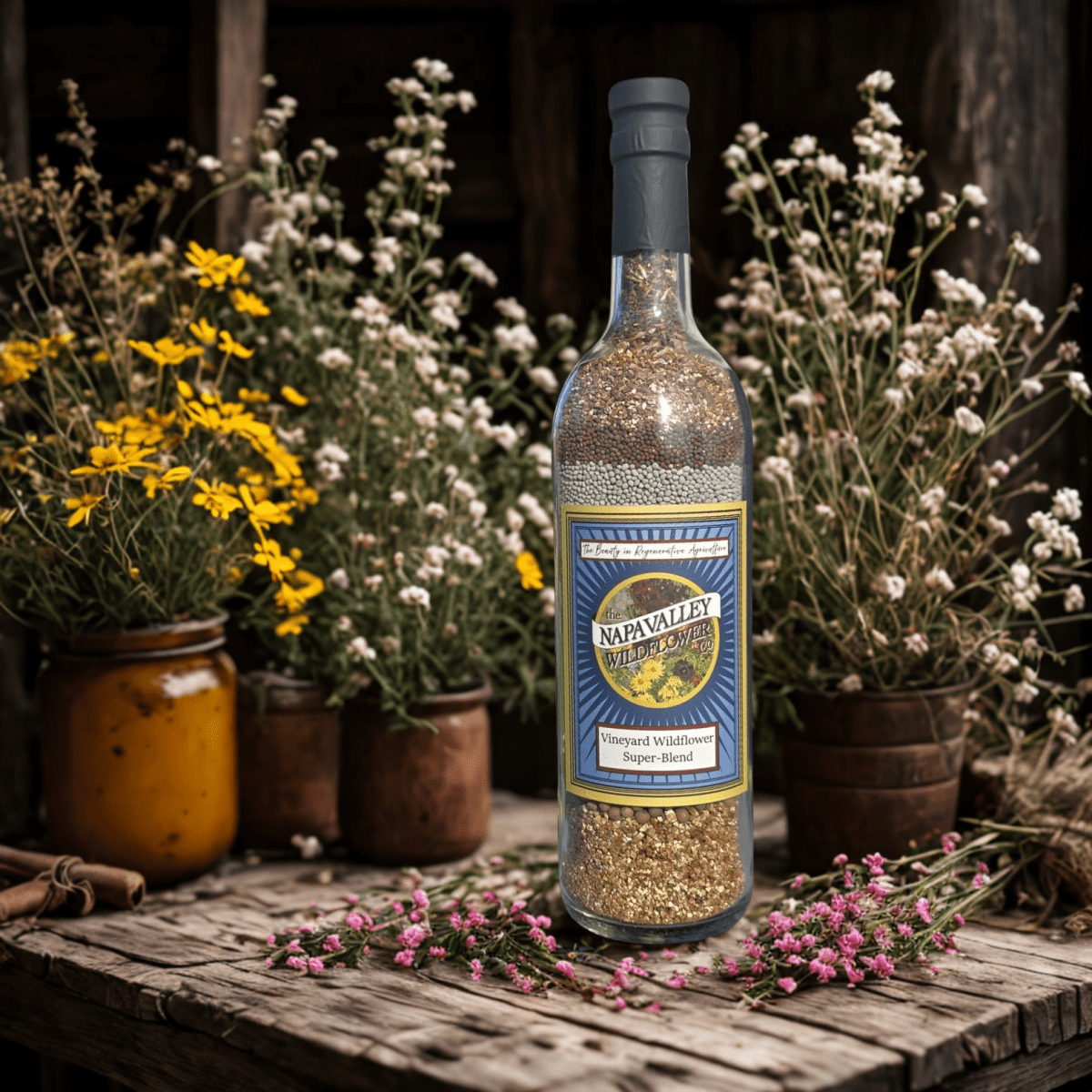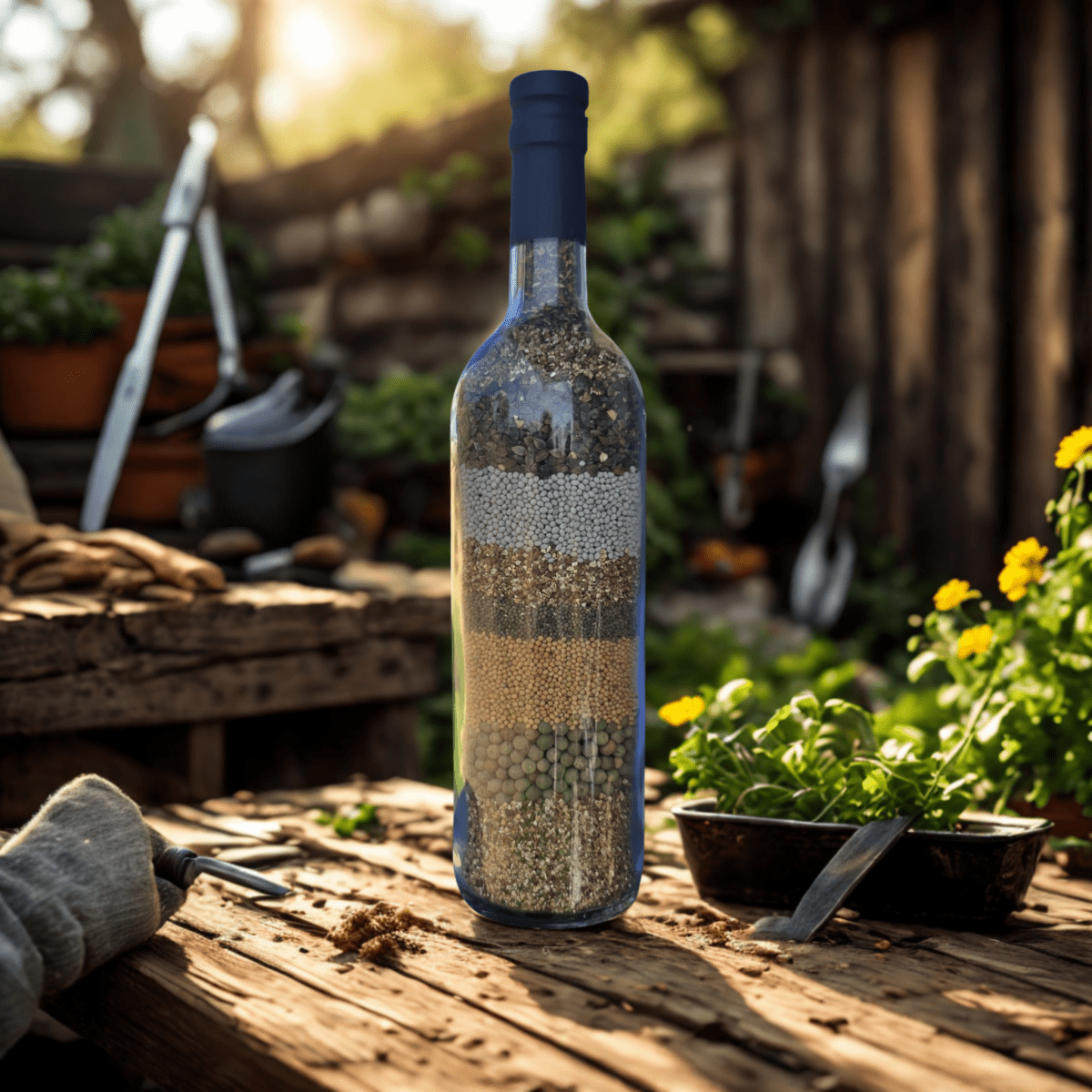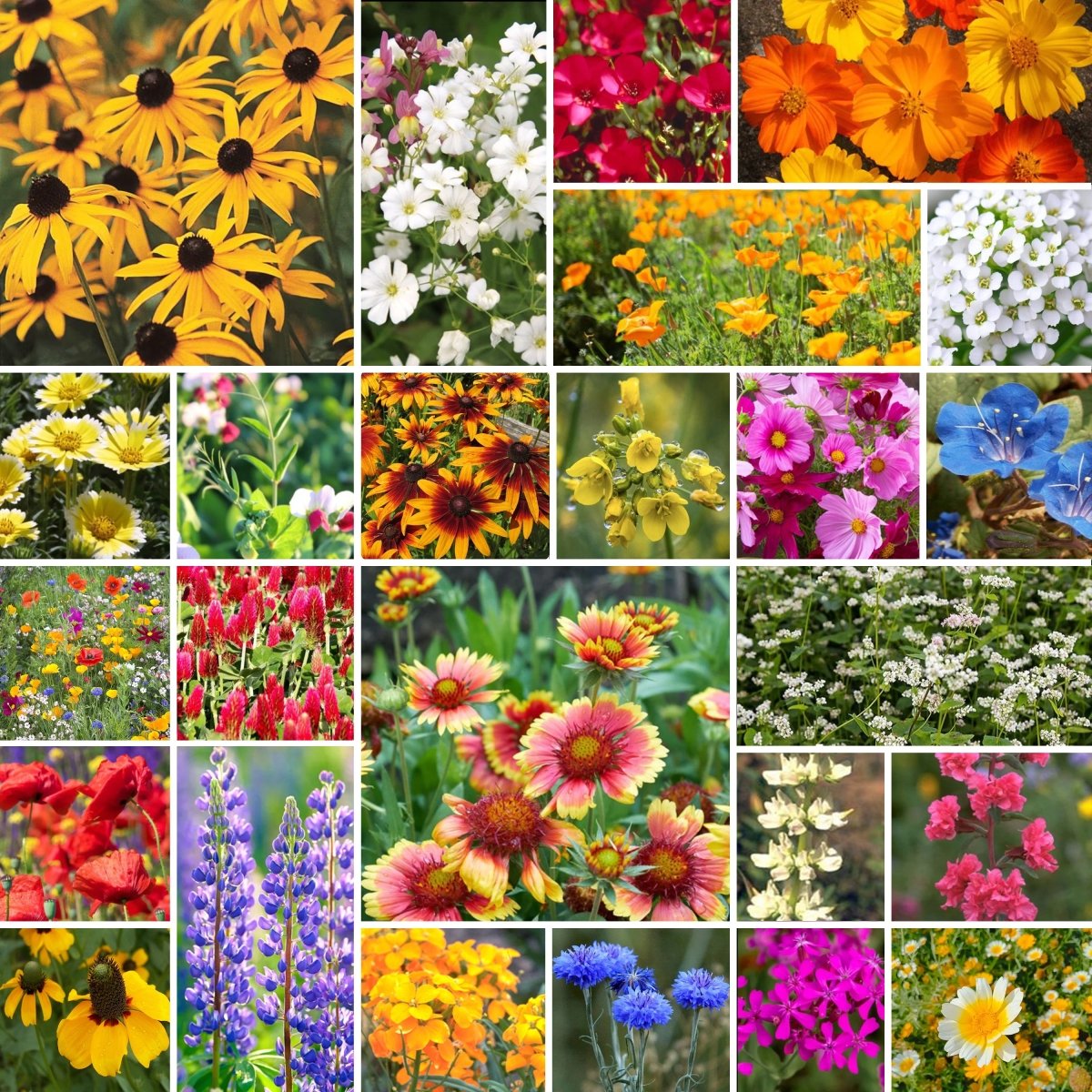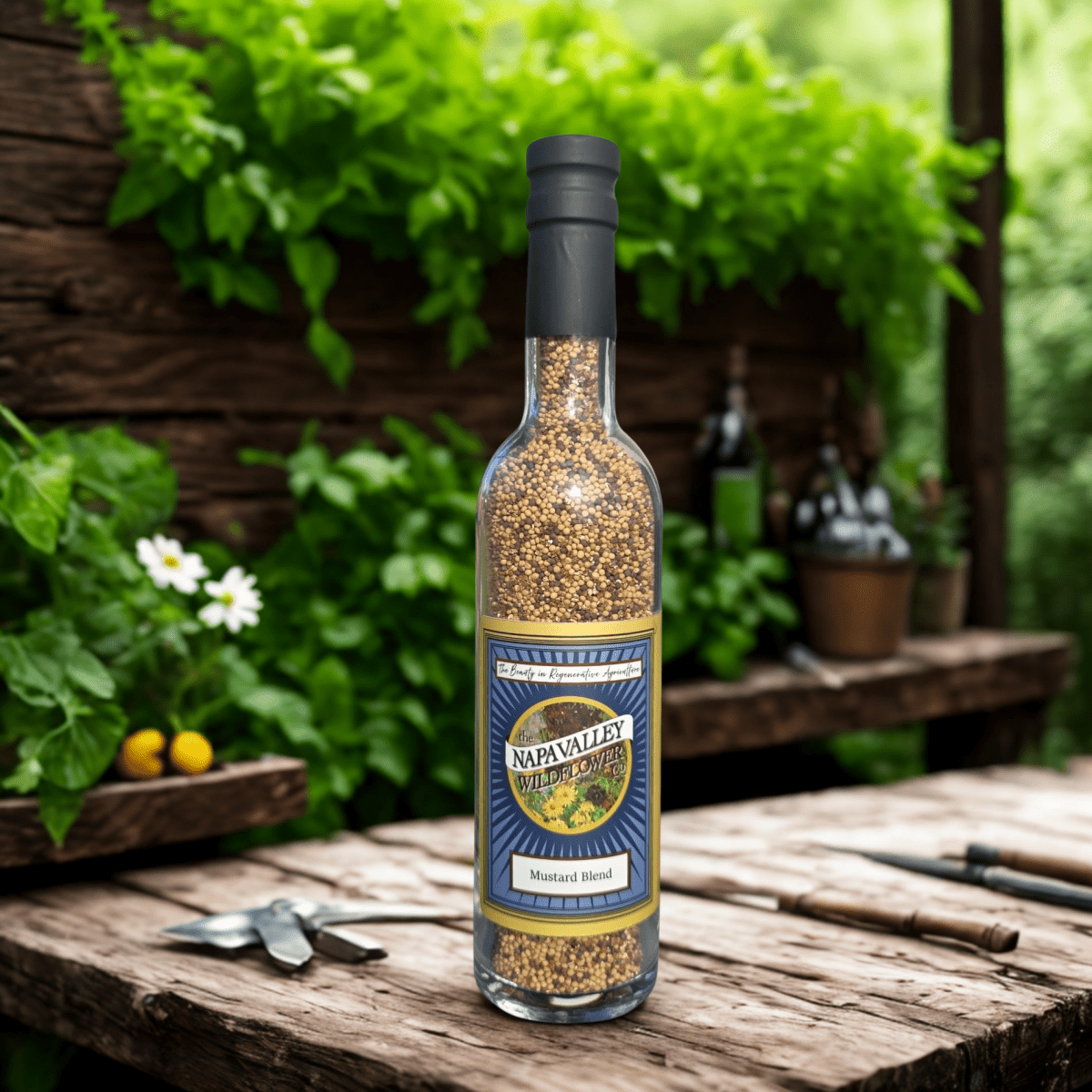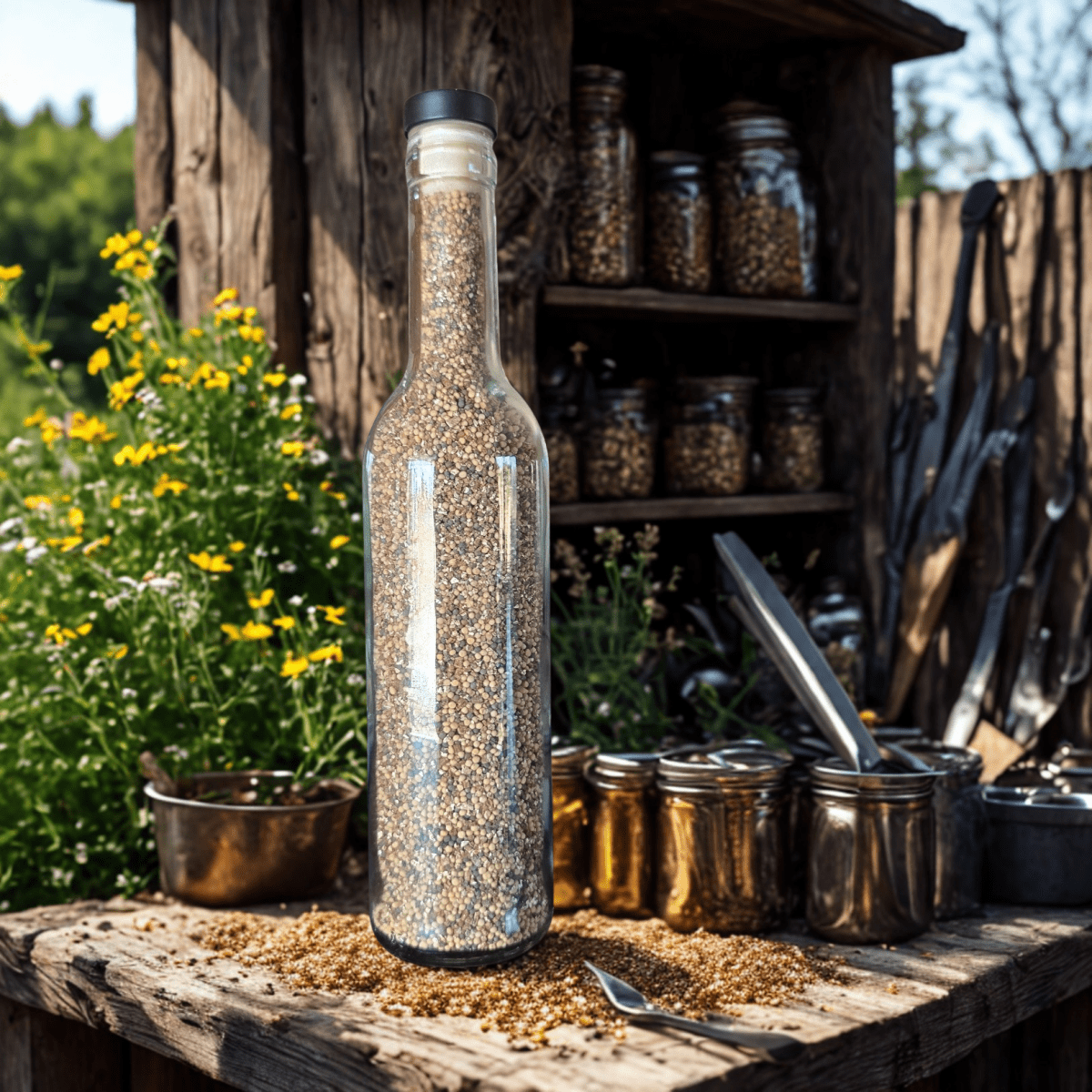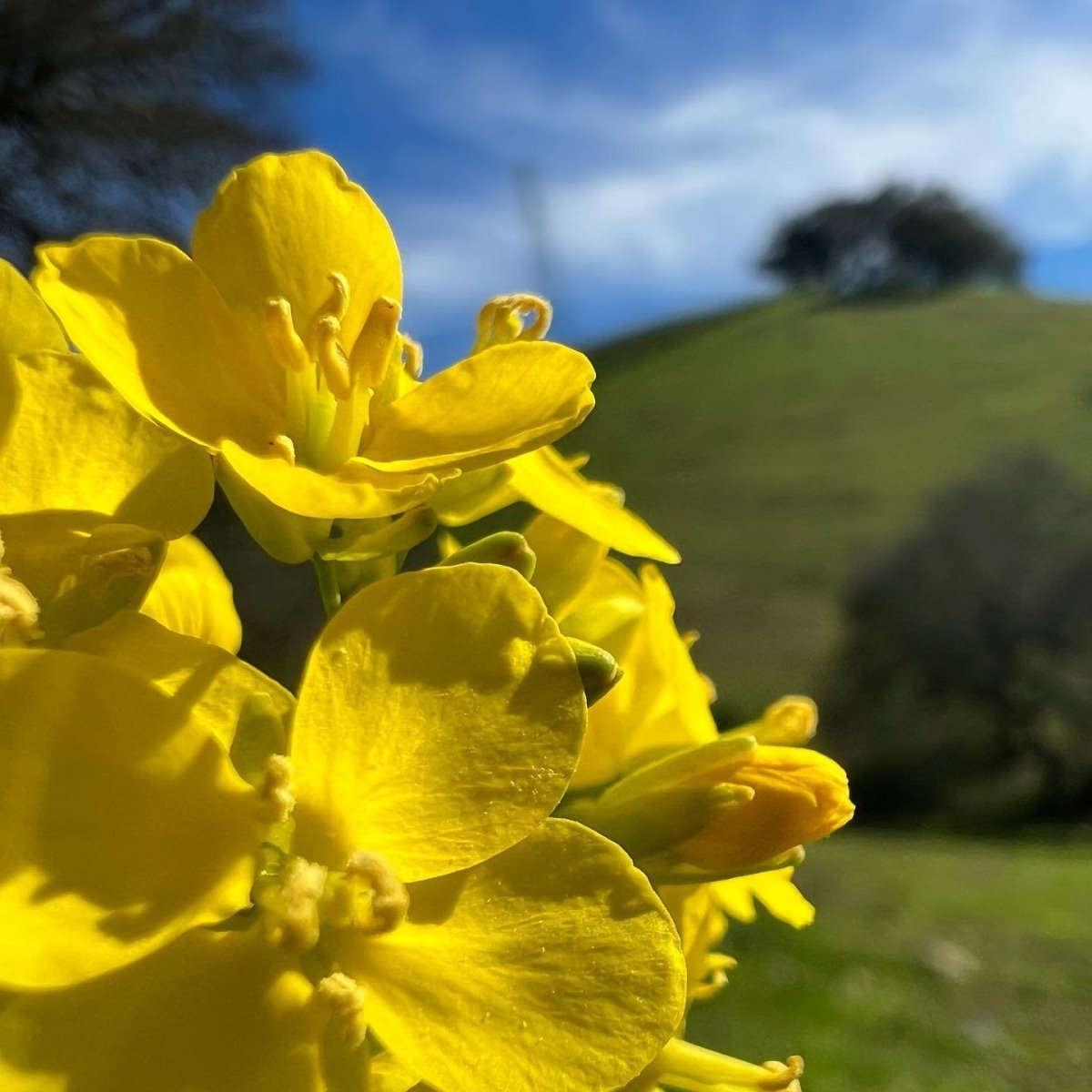Vineyard Wildflower Seed Super-Blend 750ml
The Vineyard Wildflower Seed Super-Blend is a spectacularly curated blend of wildflower seeds that include Crimson Clover, Buckwheat, Mustard, Austrian Winter Pea, California Poppy, with an additional wildflower mix layered in to create added bursts of color in your garden.
The seeds are beautifully layered in a clear Bordeaux wine bottle, each with their own unique colors, textures, and characteristics. Perfect as a gift, a keepsake, or planted in your yard.
The Beauty in Regenerative Agriculture
Wildflowers are a “secret” farmers have relied on for centuries, rotating these all-natural pesticide alternatives to strengthen and protect the soil and their crops. Even in traditional agriculture, the practice of growing cover crops has changed little over the centuries.
-
Pollinators: This garden will attract beautiful pollinators that support beneficial insect populations and aid in the pollination of various plants. Pollinators such as bees, butterflies, and hummingbirds play essential roles in the reproduction of many flowering plants, which support other wildlife, and attract predatory insects like ladybugs and hoverflies that help control pests like aphids. These pollinators are vital for plant reproduction, ensuring that flowers bloom and fruits develop, thereby supporting a thriving ecosystem. Using flowering cover crops as companion plants next to your vegetable crops is another common practice.
-
Nitrogen Fixation: The legumes in this mix, the Crimson Clover and Austrian Winter Pea, are highly effective at Nitrogen Fixation, a crucial process for maintaining soil fertility and supplying plants with this essential nutrient. By converting atmospheric nitrogen into usable forms, these plants can grow in nitrogen-deficient soils and contribute to the nutrient cycle.
-
Soil Health: These fast-growing seeds enhance soil quality and offer a natural barrier against erosion and weeds. Cover crops have deep root systems that reduce soil compaction, improve drainage and mitigate erosion, even during heavy rainfall. Soil erosion contributes to soil degradation, a process where soil loses its capacity to support plant life and other ecosystems. This decline in soil quality can be caused by various natural and human-induced factors, leading to a reduction in its productivity and the overall health of your land.
- Natural Pest Control: Mustard, known in the Brassica family, controls soilborne pests and diseases by releasing natural fumigants into the soil in a process called Biofumigation, typically eliminating pesticides, making it a very sustainable choice. Mustard also improves soil health by adding organic matter, loosening soil, and improving drainage.
Vermiculite Included! Vermiculite improves heavy soil, ensures consistent moisture, enhances aeration, and prevents compaction.
Plant in spring or fall. Mix the seeds and vermiculite well, scatter evenly on roughened dirt, and cover lightly with topsoil. Water daily until sprouts appear, then water responsibly.
Seeds must be stored in a cool, dark place unless saving as a keepsake.
Mustard Seed Blend 375ml
The Mustard Seed Blend features a refined balance of white, brown, and black mustard seeds combined in a clear 375ml Bordeaux wine bottle to celebrate the Napa Valley’s Mustard Season in the vineyards. Perfect as a gift, a keepsake, or planted in your yard.
The Beauty in Regenerative Agriculture
Each year, as winter ends and spring begins, the Napa Valley undergoes a stunning transformation. From January through March, with its peak vibrancy often seen in mid-February, the vineyards become a spectacular sea of bright yellow mustard flowers.
Mustard Season is a beloved secret of the valley, a testament to sustainable viticulture and the profound connection between nature and nurture that defines Napa’s world-class wines.
These mustard varieties are invaluable allies in vineyards. They're planted as cover crops during the dormant season of the grapevines, offering a wealth of benefits that contribute to healthier soil, more robust vines, and ultimately, higher quality wine.
These diligent cover crops do the hard work of renewing and rejuvenating the soil’s fertility, preparing the land for another cycle of exceptional grape harvests. These benefits will do the same for you!
- Mustard crops use their dense mat of vegetation and strong root system to save your soil from eroding, especially on sloped fields and vineyards. The same density can outcompete and suppress weeds by shading them out and sometimes by releasing allelopathic compounds that inhibit weed seed germination.
- When mustard plants are tilled back into the soil, they create “green manure” as they decompose and improve your soil structure, aeration, and its capacity to retain more water and nutrients.
- Mustard’s deep taproots act as “nutrient scavengers”, drawing up nutrients from deeper layers of soil that shallow crop roots may never be able to reach. When the mustard decomposes, these nutrients are released back into the topsoil.
- The extensive root system also breaks up compacted soil, improving its tilth, which enhances water filtration and air circulation, which are vital for healthy root growth.
- One of the most celebrated benefits of mustard cover crops, particularly white and brown mustard, is that they contain glucosinolates. When glucosinolates are chopped and incorporated into the soil, they release natural biofumigants, which are toxic to various soil-borne pests, fungal pathogens, and other diseases harmful to your crops. This highly reduces the need for synthetic pesticides.
- The bright yellow flowers of mustard plants are a strong attractant for various beneficial insects, including pollinators and predatory insects such as ladybugs that help control crop pests, reducing reliance on chemical insecticides.
- This cover crop also provides a habitat for a diverse range of microorganisms, contributing to a healthier and more balanced ecosystem.
Our Mustard Blend is a beautiful testament to this natural partnership, celebrating the often-unseen work that underpins Napa Valley's celebrated bounty.
Vermiculite Included! Vermiculite improves heavy soil, prevents compaction, and improves drainage and aeration.
Mustard is ideally sown in the spring and fall for cool-weather growing conditions, with planting taking place 2-4 weeks before the last spring frost and 6-8 weeks before the first fall frost. In warmer regions, it can grow throughout the winter. Mix the seeds and vermiculite well, scatter evenly across a roughened soil, and lightly sprinkle topsoil over the seed mixture. Water daily until germination and responsibly thereafter.
Seeds must be stored in a cool, dark place unless saving as a keepsake.

